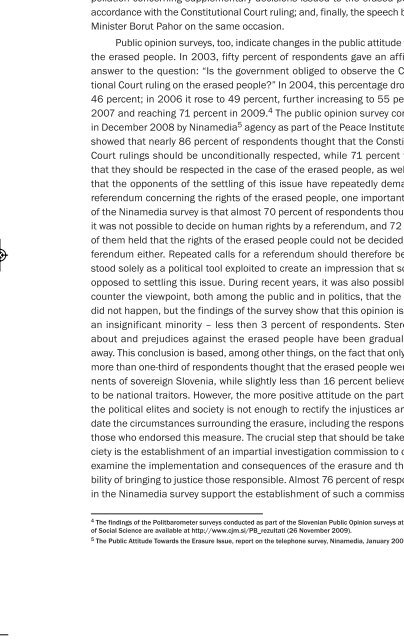The Scars of the Erasure_web
The Scars of the Erasure_web
The Scars of the Erasure_web
- No tags were found...
Create successful ePaper yourself
Turn your PDF publications into a flip-book with our unique Google optimized e-Paper software.
<strong>Erasure</strong>_4a 10.1.11 20:29 Page 1010 THE SCARS OF THE ERASURE<strong>the</strong> first by <strong>the</strong> Minister <strong>of</strong> <strong>the</strong> Interior, Katarina Kresal, on 18 November 2008in <strong>the</strong> National Assembly before <strong>the</strong> vote on her appointment, in which she highlighted<strong>the</strong> settling <strong>of</strong> <strong>the</strong> status <strong>of</strong> erased people as one <strong>of</strong> <strong>the</strong> priorities duringher term in <strong>of</strong>fice; second, her speech on 1 April 2009 in response to <strong>the</strong> interpellationconcerning supplementary decisions issued to <strong>the</strong> erased people inaccordance with <strong>the</strong> Constitutional Court ruling; and, finally, <strong>the</strong> speech by PrimeMinister Borut Pahor on <strong>the</strong> same occasion.Public opinion surveys, too, indicate changes in <strong>the</strong> public attitude towards<strong>the</strong> erased people. In 2003, fifty percent <strong>of</strong> respondents gave an affirmativeanswer to <strong>the</strong> question: “Is <strong>the</strong> government obliged to observe <strong>the</strong> ConstitutionalCourt ruling on <strong>the</strong> erased people?” In 2004, this percentage dropped to46 percent; in 2006 it rose to 49 percent, fur<strong>the</strong>r increasing to 55 percent in2007 and reaching 71 percent in 2009. 4 <strong>The</strong> public opinion survey conductedin December 2008 by Ninamedia 5 agency as part <strong>of</strong> <strong>the</strong> Peace Institute projectshowed that nearly 86 percent <strong>of</strong> respondents thought that <strong>the</strong> ConstitutionalCourt rulings should be unconditionally respected, while 71 percent thoughtthat <strong>the</strong>y should be respected in <strong>the</strong> case <strong>of</strong> <strong>the</strong> erased people, as well. Giventhat <strong>the</strong> opponents <strong>of</strong> <strong>the</strong> settling <strong>of</strong> this issue have repeatedly demanded areferendum concerning <strong>the</strong> rights <strong>of</strong> <strong>the</strong> erased people, one important finding<strong>of</strong> <strong>the</strong> Ninamedia survey is that almost 70 percent <strong>of</strong> respondents thought thatit was not possible to decide on human rights by a referendum, and 72 percent<strong>of</strong> <strong>the</strong>m held that <strong>the</strong> rights <strong>of</strong> <strong>the</strong> erased people could not be decided by a re -ferendum ei<strong>the</strong>r. Repeated calls for a referendum should <strong>the</strong>refore be understoodsolely as a political tool exploited to create an impression that society isopposed to settling this issue. During recent years, it was also possible to encounter<strong>the</strong> viewpoint, both among <strong>the</strong> public and in politics, that <strong>the</strong> erasuredid not happen, but <strong>the</strong> findings <strong>of</strong> <strong>the</strong> survey show that this opinion is held byan insignificant minority – less <strong>the</strong>n 3 percent <strong>of</strong> respondents. Stereotypesabout and prejudices against <strong>the</strong> erased people have been gradually dyingaway. This conclusion is based, among o<strong>the</strong>r things, on <strong>the</strong> fact that only slightlymore than one-third <strong>of</strong> respondents thought that <strong>the</strong> erased people were opponents<strong>of</strong> sovereign Slovenia, while slightly less than 16 percent believed <strong>the</strong>mto be national traitors. However, <strong>the</strong> more positive attitude on <strong>the</strong> part <strong>of</strong> both<strong>the</strong> political elites and society is not enough to rectify <strong>the</strong> injustices and elucidate<strong>the</strong> circumstances surrounding <strong>the</strong> erasure, including <strong>the</strong> responsibility <strong>of</strong>those who endorsed this measure. <strong>The</strong> crucial step that should be taken by societyis <strong>the</strong> establishment <strong>of</strong> an impartial investigation commission to <strong>of</strong>ficiallyexamine <strong>the</strong> implementation and consequences <strong>of</strong> <strong>the</strong> erasure and <strong>the</strong> possibility<strong>of</strong> bringing to justice those responsible. Almost 76 percent <strong>of</strong> respondentsin <strong>the</strong> Ninamedia survey support <strong>the</strong> establishment <strong>of</strong> such a commission and4 <strong>The</strong> findings <strong>of</strong> <strong>the</strong> Politbarometer surveys conducted as part <strong>of</strong> <strong>the</strong> Slovenian Public Opinion surveys at <strong>the</strong> Faculty<strong>of</strong> Social Science are available at http://www.cjm.si/PB_rezultati (26 November 2009).5 <strong>The</strong> Public Attitude Towards <strong>the</strong> <strong>Erasure</strong> Issue, report on <strong>the</strong> telephone survey, Ninamedia, January 2009.


